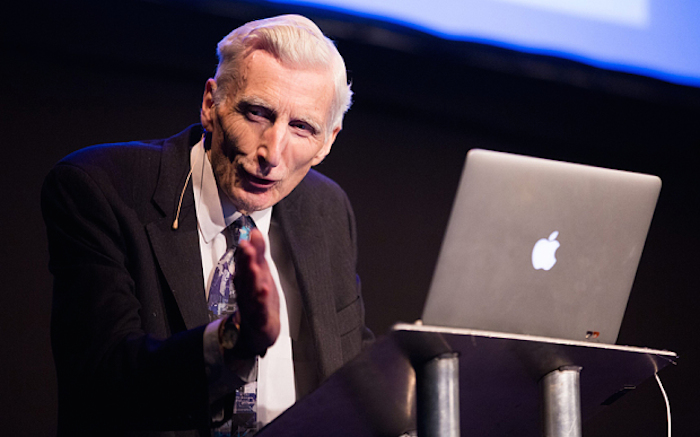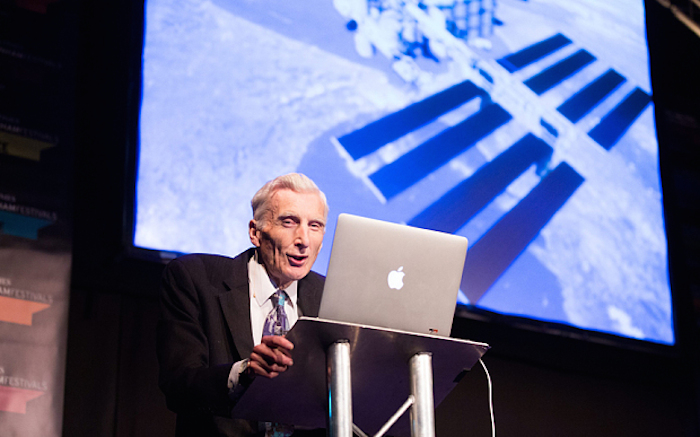.

Astronomer Royal Lord Martin Rees gives his talk on 'Mars to the Multiverse' at Cheltenham Science Festival Photo: SWNS
.
Alien contact is likely to come from machines living on other worlds outside of the solar system, the astronomer royal Martin Rees has said.
Prof Lord Rees, 72, told the Cheltenham Science Festival ‘I’m not holding my breath’ for signs of extraterrestrial life, but said if a signal was picked up it would not be from organic life, like humans.
He said that most space exploration would be carried out by machines, which would not constrained by the physical difficulties of existing in space or on other planets.
“I think it is quite likely that within a few centuries the overriding intelligence will be machines because they will have an easier time spreading beyond the Earth because they are not organic and most exploration will be by machines and not humans,” he said.
“If you were to detect a SETI (Search for Extra Terrestrial Intelligence) signal it would be far more likely that it would be from a machine and not an organic creature.
“There has been just a thin sliver of time when organic beings have existed and billions of years after machines will take over, so they will be the future.”
Prof Rees said that only a few adventurous humans would ever leave Earth to colonise the solar system, where they would be forced to use technology to adapt to inhabitable worlds and start new civilisations.
He claimed that such cyber adaptations to new planets or moons would mark the start of the ‘post-human era.’
Space Adventures Ltd is already planning the first tourist trips to the dark side of the Moon, while SpaceX, the company founded by Elon Musk which regularly delivers payloads to the International Space Station, is hoping to start transporting tourists as well as cargo into space in the near future.
.

Prof Lord Rees, 72, told the Cheltenham Science Festival ‘I’m not holding my breath’ for signs of extraterrestrial life
.
Musk has also spoken of his ambitions to start a colony on Mars stating he would like to die on the planet ‘just not on impact.’
Astronauts have not ventured beyond low Earth obit since the last manned flight to the Moon in 1972.
Prof Rees said: “We won’t see another Apollo mission because that was fuelled by super-power rivalry. I think there will be people who go, but not in the mode of traditional astronauts, but crazy adventurers like Ranulph Feinnes and Elon Musk.
“By the end of the century there will be some people living away from the Earth. We will wish them good look in adapting their progeny who will need genetic adaptations.
“That will be the start of the post-human era because they will evolve to be a new species.
"I would predict that in the next 50 years or so all of the bodies in the solar system will have been mapped and probed by machine and some people will follow."
Prof Rees said he was concerned about the rise in biotechnology and warned that computers and robots will soon be so advanced they will be able to create the next generation of machines without human intervention.
Stephen Hawking recently cautioned that the rise in artificial intelligence could spell the end of mankind.
“Some people think we ought to have guidelines while other people we think we should not worry about that. I am certainly concerned about these sub autonomous military robots which can just put bullets in people” Prof Rees added.
“But Stephen Hawking has pronounced on this in a dogmatic way and got much more traction that the vein deserves,” he added.
Quelle: The Telegraph
4900 Views
